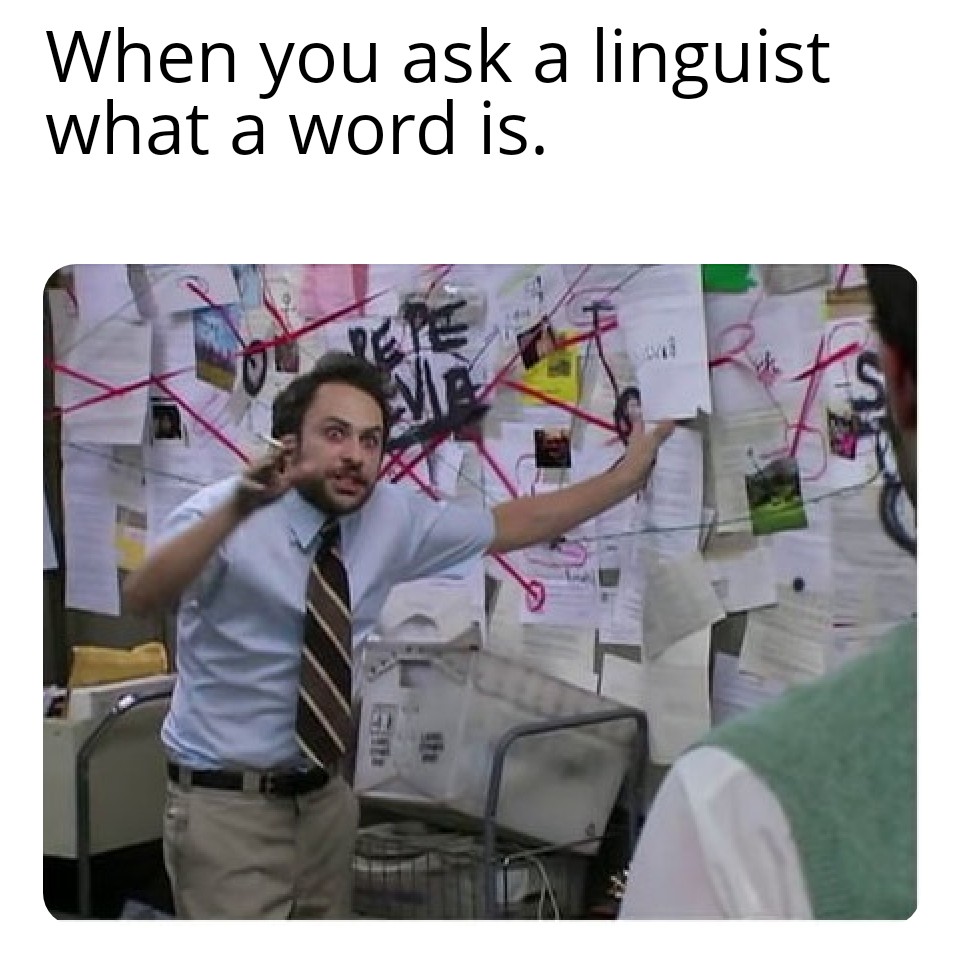this post was submitted on 13 Nov 2024
206 points (96.4% liked)
Linguistics Humor
1153 readers
2 users here now
Do you like languages and linguistics ? Here is for having fun about it
Share this community: [[email protected]](/c/[email protected])
Serious Linguistics community: [email protected]
Rules:
- 1- Stay on Topic
Not about Linguistics, language, ways of communications - 2- No Racism/Violence
- 3- No Public Shaming
Shaming someone that could be identifiable/recognizable - 4- Avoid spam and duplicates
founded 2 years ago
MODERATORS
you are viewing a single comment's thread
view the rest of the comments
view the rest of the comments

Letters arranged in such a way as to convey a thought.
That definition could apply to a whole sentence (or novel), or a sound like "pfft." Or it could be an initialism, a movie rating, or an analyzed string of DNA. All these and more are letters arranged in a way as to convey thought.
An analyzed string of DNA is letters arranged to convey a living creature; not a thought. 😌
Ah, well that explains away one of the examples... You must be right! (I'd argue that the analysis of DNA is a thought/type of understanding, rather than the essence of a living thing, but that quickly gets towards another linguistic argument of Sausserian structuralism vs post structuralism.)
I'm not taking any of this seriously, but if others want to continue taking it that way I'll play along :p
not necessarily.
That only moves the question to what a thought is. Also: why only written language? Aren't there spoken or signed words?
Fits your definition, isn't a word.
Fits your definition, isn't a word
Doesn't fit your definition, could be considered a word
Doesn't fit your definition, could be considered a word.
Also, your definition doesn't include spoken languages, or words in languages that don't use letters to build words.
The first two do not fit the description, as neither is conveying a thought. Those aren't words. They're onomatopoeias.
Spoken words are still made up of letters, even if they're not written down.
Just because they aren't roman letters, does not mean they aren't letters. Cuniform and hieroglyphs are just a different kind of letter.
They do convey thoughts, which is why you know what they mean.
They're not onomatopoeia, because they aren't made to reflect sounds (though the first one reflects a sound a person would produce with their vocal tract, those aren't usually called onomatopoeia).
Spoken language came before written language. Words existed long before letters were invented. So then letters making up words can't be the definition of words because words existed before letters existed to "form" them.
They don't need to be Roman letters, but many written languages don't use letters. I'm not sure about cuneiform, but I know that not all hieroglyphs are letters. Chinese is another written language that doesn't use letters, for example.
I'm sorry but even as a joke, this is just way too wrong. The examples given of "Mmmmmmmmmmmmmmmmm" and "Aaaarfgfhfhrhhhh" have no meaning. They are, at best, sounds. Making them onomatopoeias.
Mmmm is something that people (English-speakers?) say when something tastes good, seems appetizing, or is interesting or arousing or something. It's not exactly a word, but it's not an onomatopoeia.
"Aaaarfgfhfhrhhhh" would be an example of someone typing frustratedly into the keyboard (or mashing their keyboard) because something didn't go their way. It's an arrangement of letters to express frustration. It isn't even necessarily a sound that anyone would vocalize. So it's an arrangement of letters that conveys a thought but isn't a word.